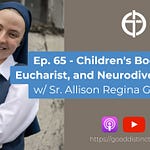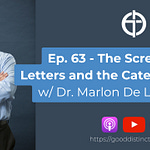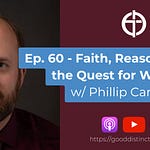It was my great pleasure to speak with Dr. John DiCamillo about end of life issues and bioethics. Thank you very much to Samantha Stephenson of Brave New Us for the introduction!
Summary
Dr. John DiCamillo from the National Catholic Bioethics Center discusses end-of-life issues, specifically euthanasia and physician-assisted suicide. He explains that euthanasia is the deliberate taking of human life to eliminate suffering, either through commission or omission. Assisted suicide, on the other hand, is when the patient themselves takes action to end their own life with the help of a healthcare professional. Dr. DiCamillo emphasizes the importance of treating suffering rather than eliminating the sufferer, and highlights the need to address the spiritual and emotional aspects of suffering as well. He also encourages individuals to support and sustain the dignity of human life in their own families and communities as a way to change the culture surrounding end-of-life issues. In this conversation, Dr. John A. DiCamillo discusses the distinction between ordinary and extraordinary means in medical care and the importance of making prudential judgments based on the benefits and burdens of treatment. He explains that the Church teaches that basic human care, including nourishment and hydration, is always morally obligatory. However, there are exceptions to this rule, such as when the treatment is not achieving its intended purpose or when it is causing serious harms or complications. Dr. DiCamillo emphasizes that the finality of nutrition and hydration is to nourish and hydrate, not to heal or cure medical conditions.
Takeaways
Euthanasia is the deliberate taking of human life to eliminate suffering, while assisted suicide is when the patient themselves takes action to end their own life with the help of a healthcare professional.
Treating suffering rather than eliminating the sufferer is a key principle in Catholic moral theology.
Addressing the spiritual and emotional aspects of suffering is important in addition to medical treatment.
Supporting and sustaining the dignity of human life in families and communities can help change the culture surrounding end-of-life issues. The distinction between ordinary and extraordinary means in medical care is based on the judgment of whether a treatment offers a reasonable hope of benefit without imposing excessive burdens.
Prudential judgments about medical care should be made on a case-by-case basis, taking into account the specific circumstances and the individual's overall life circumstances.
Basic human care, including nourishment and hydration, is always morally obligatory, but there are exceptions when the treatment is not achieving its intended purpose or is causing serious harms or complications.
The finality of nutrition and hydration is to nourish and hydrate, not to heal or cure medical conditions.
Sound Bites
"Treat the suffering, don't eliminate the sufferer."
"Average Catholics in a parish who are calling us for help with decisions, but they're already like, 'Yeah, I've been taking care of my mother for 15 years at home.'"
"Just be a witness right where you are. Do what you can."
"Make your voice heard at that time too so that your local communities and political communities, again from the local level up through the state and the national level, your voice does matter in that way as well."
"If we transgress some of these things we are participating in the culture of death whether we acknowledge it or not."
"Ordinary and extraordinary means simply come down to a judgment of does this treatment offer a reasonable hope of benefit without imposing excessive burdens."
Do you have a question for the National Catholic Bioethics Center’s ethicists? Click HERE to submit a question!
Keywords
end-of-life issues, euthanasia, physician-assisted suicide, suffering, dignity of human life, culture change, ordinary means, extraordinary means, medical care, prudential judgment, benefits and burdens, basic human care, nourishment and hydration










